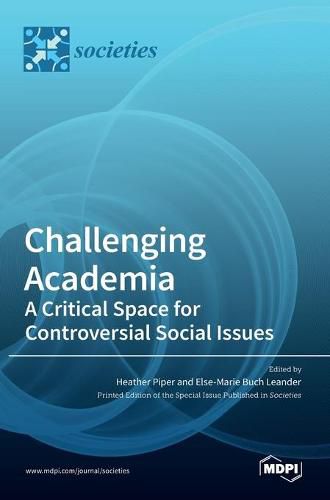Readings Newsletter
Become a Readings Member to make your shopping experience even easier.
Sign in or sign up for free!
You’re not far away from qualifying for FREE standard shipping within Australia
You’ve qualified for FREE standard shipping within Australia
The cart is loading…






This title is printed to order. This book may have been self-published. If so, we cannot guarantee the quality of the content. In the main most books will have gone through the editing process however some may not. We therefore suggest that you be aware of this before ordering this book. If in doubt check either the author or publisher’s details as we are unable to accept any returns unless they are faulty. Please contact us if you have any questions.
Some social issues and practices have become dangerous areas for academics to research and write about. ‘Academic freedom’ is increasingly constrained, not just by long established ‘normal’ factors (territoriality, power differentials, competition, protectionism), but also by the increased significance of social media and the rise of identity politics (and activists who treat work which challenges their world view as abusive hate-speech). So extreme are these pressures that some institutions and even statutory bodies now adopt policies and practices which contravene relevant regulations and laws. This book seeks to draw attention to the limiting and damaging effects of academic ‘gagging’.
The book, drawn from a special edition of Societies, offers an eclectic series of international articles which may annoy some people. The book challenges taken for granted mainstream assumptions and practices in a number of areas, including gender mainstreaming, social work education, child sexual abuse, the ethnic disaggregation of population groups, fatherhood and masculinity, the erosion of democratic legitimacy, the trap of victimhood and vulnerability, employment practices in universities, and the challenges presented by the widespread and deliberate suppression of scholarship and research. In an analytic postscript Laurent Dubreuil discusses the nature of identity politics and the manner in which its effects can be identified across the many topics covered in these challenging articles.
$9.00 standard shipping within Australia
FREE standard shipping within Australia for orders over $100.00
Express & International shipping calculated at checkout
This title is printed to order. This book may have been self-published. If so, we cannot guarantee the quality of the content. In the main most books will have gone through the editing process however some may not. We therefore suggest that you be aware of this before ordering this book. If in doubt check either the author or publisher’s details as we are unable to accept any returns unless they are faulty. Please contact us if you have any questions.
Some social issues and practices have become dangerous areas for academics to research and write about. ‘Academic freedom’ is increasingly constrained, not just by long established ‘normal’ factors (territoriality, power differentials, competition, protectionism), but also by the increased significance of social media and the rise of identity politics (and activists who treat work which challenges their world view as abusive hate-speech). So extreme are these pressures that some institutions and even statutory bodies now adopt policies and practices which contravene relevant regulations and laws. This book seeks to draw attention to the limiting and damaging effects of academic ‘gagging’.
The book, drawn from a special edition of Societies, offers an eclectic series of international articles which may annoy some people. The book challenges taken for granted mainstream assumptions and practices in a number of areas, including gender mainstreaming, social work education, child sexual abuse, the ethnic disaggregation of population groups, fatherhood and masculinity, the erosion of democratic legitimacy, the trap of victimhood and vulnerability, employment practices in universities, and the challenges presented by the widespread and deliberate suppression of scholarship and research. In an analytic postscript Laurent Dubreuil discusses the nature of identity politics and the manner in which its effects can be identified across the many topics covered in these challenging articles.